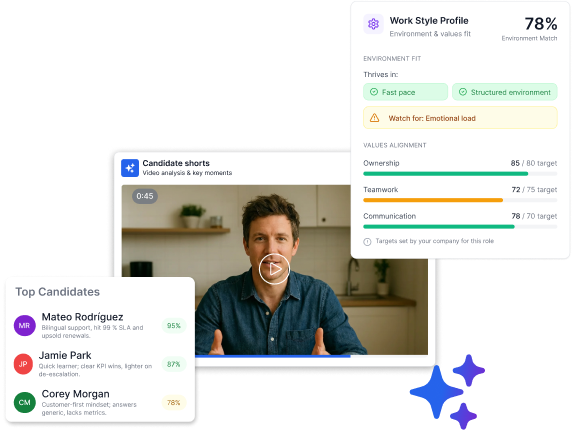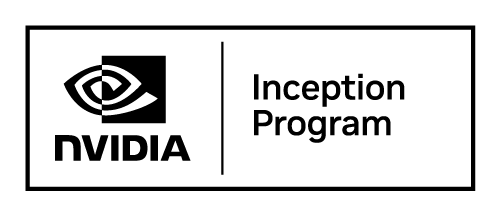In the world of remote hiring, a new kind of interview prep is thriving. It is not the old-fashioned kind involving note cards and mock calls, but real-time AI whispering answers through hidden screens, earpieces, or live chat overlays.
AI video interview cheating has moved from a fringe behavior to a common practice in tech circles. This trend is raising deep concerns about fairness, trust, and what it even means to be qualified for a role.
What is AI interview cheating?
AI interview cheating refers to the use of artificial intelligence tools to gain an unfair advantage during live job interviews, especially in technical roles. This can range from using ChatGPT or Claude to solve coding challenges in real time to more elaborate setups where candidates are fed answers through covert communication methods.
Some examples include:
- A candidate lip-syncing while someone off-camera answers on their behalf
- A browser-based AI tool listening to the recruiter and displaying live answers for the candidate to read out
- Invisible earpieces or screen overlays feeding candidates responses to technical or behavioral questions
This is not a theoretical issue. Roy Lee, a student at Columbia University, was expelled for founding Interview Coder. It was a paid service that helped people cheat their way through interviews with major tech firms. His platform claimed a 65% success rate for users, including hires at Amazon and Microsoft.

Why it is AI interview cheating spreading so quickly
There are several key reasons why AI interview cheating is growing at a rapid pace.
1. The shift to remote interviews
The COVID-19 pandemic forced nearly every company into remote hiring processes. What was initially a temporary solution has become the new standard. However, remote interviews make it significantly easier to cheat. Candidates are no longer confined to a physical room with a whiteboard and a proctor. They can hide a second screen, have a helper in another room, or access real-time AI support without detection.
2. The power of generative AI
Large language models can now do things that were unthinkable just a few years ago. They can:
- Solve over 90% of hard LeetCode questions in seconds
- Generate code in multiple languages
- Debug and explain logic in plain English
- Simulate mock interviews and behavioral Q and A sessions
These capabilities make them ideal co-pilots or, in some cases, crutches for job seekers who are willing to bend the rules.
3. The pressure to break into tech
Big Tech interviews are notoriously difficult. Candidates often invest hundreds of hours studying for algorithmic challenges that have little connection to real-world engineering work. Some candidates see AI use as a way to level the playing field rather than as cheating. Plus, if tech companies are building AI-first recruiting products, why should job seekers not be allowed to become AI-first candidates?
How AI interview cheating works in real life
Let us look at how this actually plays out in practice.
Before the interview:
Candidates use AI tools like ChatGPT, DeepSeek, or Claude to prepare for technical questions. They rehearse answers, fine-tune their resumes, and even research the interviewer or company in depth.
During the live interview:
- Candidates may share their screen selectively, keeping a second monitor off camera
- They might use browser extensions or co-browsers with AI chat interfaces
- Some use hidden earpieces to receive whispered answers
- Tools like Final Round AI transcribe the recruiter’s question and generate a suggested response on screen in real time
After the interview:
Some platforms, like the now-defunct Interview Coder, offered follow-up coaching or preloaded prompts tailored to the next interview stage.
The growing scale of the AI interview cheating problem
This is not just a few bad actors. Studies and investigative reports reveal the scope:
- About 27% of technical candidates admit to using AI during interviews
- One in five hiring processes show signs of AI-generated assistance
- In 2024 alone, over 200 incidents of fake candidates were recorded by North American companies. This includes identity substitution, where an expert takes the interview on behalf of the real candidate
Amazon has revoked internship offers after uncovering AI cheating. Google is considering a return to on-site interviews. Microsoft is training systems to detect artificially generated code through reverse engineering and pattern recognition.
The ethical dilemma: AI in the workplace versus AI in interviews
A major contradiction sits at the heart of this debate. Companies like Google and Amazon encourage engineers to use AI tools in their daily work. In fact, over 25% of Google’s codebase is now AI-generated.
Yet, during interviews, these same tools are often banned.
This double standard leads to confusion and mistrust. Candidates feel they are penalized for using tools that employers themselves advocate for productivity. Recruiters, meanwhile, are left wondering whether they are hiring genuine talent or simply someone who knows how to orchestrate a machine.
What companies are risking
1. Making bad hires: Candidates who ace technical screens using AI may struggle once they are on the job. An Amazon recruiter shared an example where a newly hired engineer did not know how to use Git on their first day.
2. Losing trust in the hiring process: Interviewers begin from a place of suspicion, especially in remote or international contexts.
3. Inflated metrics: If cheating is widespread, companies may wrongly believe their hiring process is working. In reality, they may be selecting candidates based on who cheats most effectively.
4. Misaligned evaluation signals: When AI can generate, explain, and debug code instantly, interviews may no longer test the skills that matter most for the role.
What companies are doing to fight back against AI cheatig
Several measures are now being implemented across the industry:
1. Closed environments: Google’s Project Campfire hosts interviews in secure, browser-based environments with no internet access.
2. Detection systems: Microsoft is developing tools that analyze metadata and language patterns to spot AI-generated code.
3. Behavioral curveballs: Interviewers increasingly test for depth by asking follow-up questions that cannot be easily predicted or scripted by AI.
4. Work sample testing: More companies are relying on real-world tasks and collaboration-based exercises that better simulate job performance.
What candidates need to understand about AI interview cheating
Tempted to bring AI into your live interview? Consider the risks carefully:
- Getting caught could result in offer revocation or being blacklisted from an entire company or industry segment
- Even if you land the job, underperforming due to overreliance on AI can lead to early termination and lasting reputational harm
- Employers are beginning to embed trap questions or sudden shifts in topic to flush out canned answers or live AI usage
That said, using AI for preparation is both fair and recommended. Use it to practice answers, fine-tune your resume, simulate interview questions, and research your target company. Just do not bring the AI into the interview room.
The bigger question: what should interviews actually assess?
The rise of AI interview cheating is not just a matter of bad actors or new technology. It highlights deeper flaws in how hiring is designed.
If candidates feel they need to cheat to pass an interview, then maybe the format itself is part of the problem. Companies should reconsider:
- Replacing abstract coding challenges with walkthroughs of previous projects
- Prioritizing communication, collaboration, and problem-solving over brute memorization
- Incorporating AI literacy into assessments rather than banning it altogether
A changing definition of merit
Artificial intelligence is changing how we work, how we learn, and how we present ourselves. It is also changing what employers consider to be talent.
In this new world, the question is not just who can write code, but who can direct technology effectively. At the same time, honesty and independent thinking remain foundational traits for any professional environment.
AI is not going away. The companies that will succeed are those that design hiring processes around this new reality. They will create clear policies, fair guardrails, and honest conversations about how technology can be used ethically.
And candidates who treat AI as a smart assistant, not a secret weapon, will be the ones who thrive.
Final thoughts: AI is a tool, not a ticket
Hiring should never be about gaming the system. The real work begins after the offer is signed. If AI helps you prep and boosts your confidence, use it. But if you find yourself relying on AI to fake your way through a conversation, it may be time to ask if you are aiming for the right role.
The future of hiring depends on a shared understanding between companies and candidates. Everyone wants speed, clarity, and fairness. That means designing systems that reward genuine skill, thoughtful preparation, and ethical conduct.
The challenge now is to update our tools, expectations, and evaluations to meet that standard.




